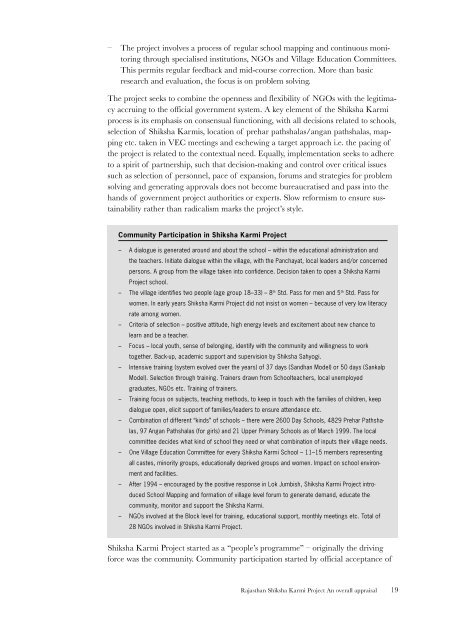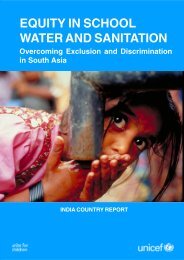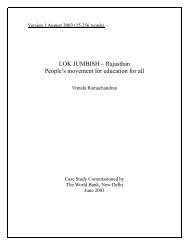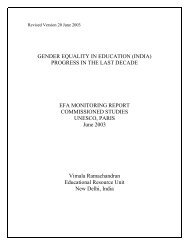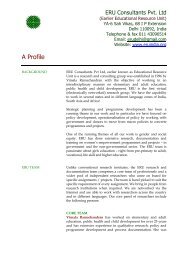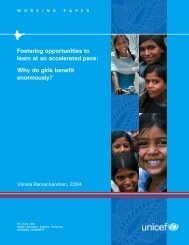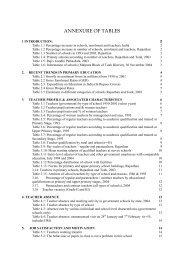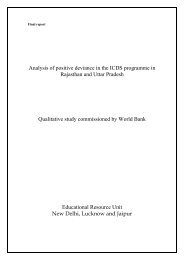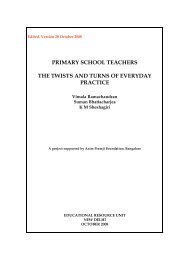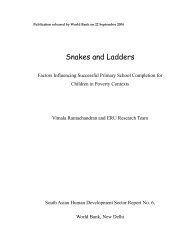Rajasthan Shiksha Karmi Project An overall appraisal
Rajasthan Shiksha Karmi Project An overall appraisal
Rajasthan Shiksha Karmi Project An overall appraisal
Create successful ePaper yourself
Turn your PDF publications into a flip-book with our unique Google optimized e-Paper software.
– The project involves a process of regular school mapping and continuous monitoringthrough specialised institutions, NGOs and Village Education Committees.This permits regular feedback and mid-course correction. More than basicresearch and evaluation, the focus is on problem solving.The project seeks to combine the openness and flexibility of NGOs with the legitimacyaccruing to the official government system. A key element of the <strong>Shiksha</strong> <strong>Karmi</strong>process is its emphasis on consensual functioning, with all decisions related to schools,selection of <strong>Shiksha</strong> <strong>Karmi</strong>s, location of prehar pathshalas/angan pathshalas, mappingetc. taken in VEC meetings and eschewing a target approach i.e. the pacing ofthe project is related to the contextual need. Equally, implementation seeks to adhereto a spirit of partnership, such that decision-making and control over critical issuessuch as selection of personnel, pace of expansion, forums and strategies for problemsolving and generating approvals does not become bureaucratised and pass into thehands of government project authorities or experts. Slow reformism to ensure sustainabilityrather than radicalism marks the project’s style.Community Participation in <strong>Shiksha</strong> <strong>Karmi</strong> <strong>Project</strong>– A dialogue is generated around and about the school – within the educational administration andthe teachers. Initiate dialogue within the village, with the Panchayat, local leaders and/or concernedpersons. A group from the village taken into confidence. Decision taken to open a <strong>Shiksha</strong> <strong>Karmi</strong><strong>Project</strong> school.– The village identifies two people (age group 18–33) – 8 th Std. Pass for men and 5 th Std. Pass forwomen. In early years <strong>Shiksha</strong> <strong>Karmi</strong> <strong>Project</strong> did not insist on women – because of very low literacyrate among women.– Criteria of selection – positive attitude, high energy levels and excitement about new chance tolearn and be a teacher.– Focus – local youth, sense of belonging, identify with the community and willingness to worktogether. Back-up, academic support and supervision by <strong>Shiksha</strong> Sahyogi.– Intensive training (system evolved over the years) of 37 days (Sandhan Model) or 50 days (SankalpModel). Selection through training. Trainers drawn from Schoolteachers, local unemployedgraduates, NGOs etc. Training of trainers.– Training focus on subjects, teaching methods, to keep in touch with the families of children, keepdialogue open, elicit support of families/leaders to ensure attendance etc.– Combination of different “kinds” of schools – there were 2600 Day Schools, 4829 Prehar Pathshalas,97 <strong>An</strong>gan Pathshalas (for girls) and 21 Upper Primary Schools as of March 1999. The localcommittee decides what kind of school they need or what combination of inputs their village needs.– One Village Education Committee for every <strong>Shiksha</strong> <strong>Karmi</strong> School – 11–15 members representingall castes, minority groups, educationally deprived groups and women. Impact on school environmentand facilities.– After 1994 – encouraged by the positive response in Lok Jumbish, <strong>Shiksha</strong> <strong>Karmi</strong> <strong>Project</strong> introducedSchool Mapping and formation of village level forum to generate demand, educate thecommunity, monitor and support the <strong>Shiksha</strong> <strong>Karmi</strong>.– NGOs involved at the Block level for training, educational support, monthly meetings etc. Total of28 NGOs involved in <strong>Shiksha</strong> <strong>Karmi</strong> <strong>Project</strong>.<strong>Shiksha</strong> <strong>Karmi</strong> <strong>Project</strong> started as a “people’s programme” – originally the drivingforce was the community. Community participation started by official acceptance of<strong>Rajasthan</strong> <strong>Shiksha</strong> <strong>Karmi</strong> <strong>Project</strong> <strong>An</strong> <strong>overall</strong> <strong>appraisal</strong>19


